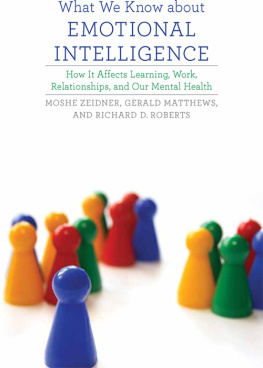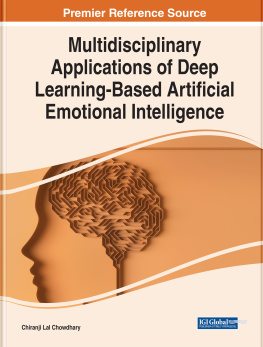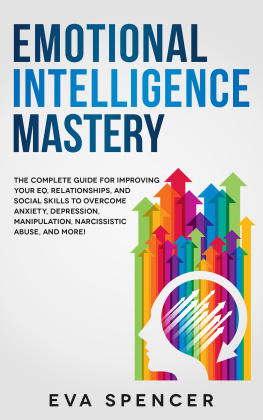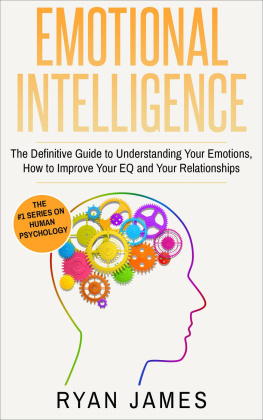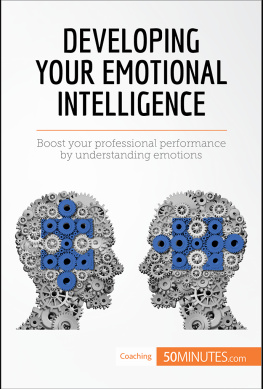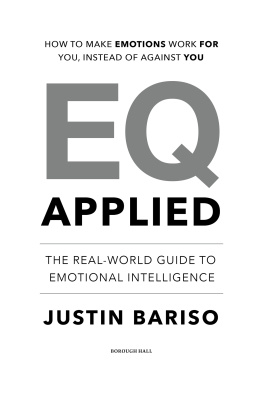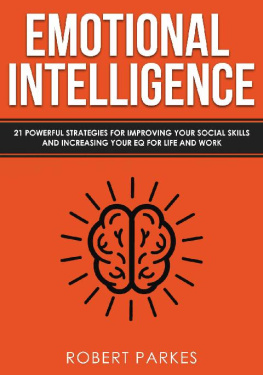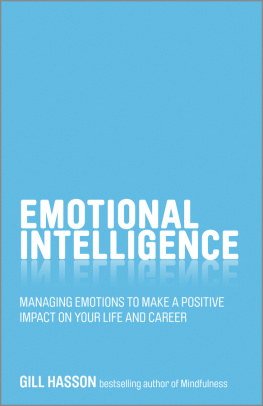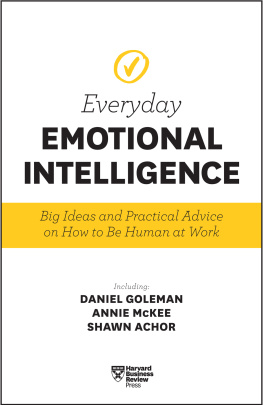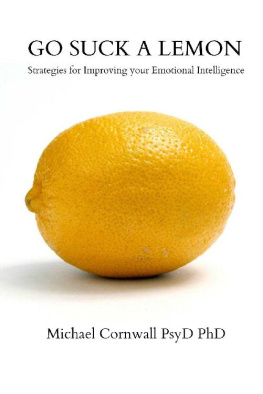
What We Know about Emotional Intelligence
2009 Massachusetts Institute of Technology
All rights reserved. No part of this book may be reproduced in any form by any electronic or mechanical means (including photocopying, recording, or information storage and retrieval) without permission in writing from the publisher.
MIT Press books may be purchased at special quantity discounts for business or sales promotional use. For information, please email special_sales@mitpress.mit.edu or write to Special Sales Department, The MIT Press, 55 Hayward Street, Cambridge, MA 02142.
This book was set in Times New Roman and Syntax on 3B2 by Asco Typesetters, Hong Kong and was printed and bound in the United States of America.
Library of Congress Cataloging-in-Publication Data
Zeidner, Moshe.
What we know about emotional intelligence : how it affects learning, work, relationships, and our mental health / Moshe Zeidner, Gerald Matthews, and Richard D. Roberts.
p. cm.
A Bradford book.
Includes bibliographical references and index.
ISBN 978-0-262-01260-7 (hardcover : alk. paper)ISBN 978-0-262-25501-1 (el)
1. Emotional intelligence. I. Matthews,
Gerald. II. Roberts, Richard D. III. Title.
BF576.Z45 2009
152.4dc22
2008038272
10 9 8 7 6 5 4 3 2 1
to Omer and Yair Zeidner, with admiration and love
to Diana Ciupka
to Cristina Aicher, Matthew D. Roberts, and Lionel R. Benevides
Contents
Foreword by James Averill
Preface
Acknowledgments
| I |
| 1 | Emotional Intelligence: Mapping out the Terrain |
| II |
| 2 | Measure for Emotional Intelligence Measures |
| 3 | The Intelligence in Emotional Intelligence |
| 4 | The Personality in Emotional Intelligence |
| III |
| 5 | Developing Emotional Intelligence: From Birth to Earth |
| 6 | How Social Is Emotional Intelligence? |
| 7 | Grace under Pressure: Emotional Intelligence, Stress, and Coping |
| IV |
| 8 | Schooling Emotional Intelligence |
| 9 | Work and Emotional Intelligence |
| 10 | Emotional Intelligence and the Toxic Work Environment |
| 11 | Emotional Intelligence in the Clinic |
| V |
| 12 | Emotional Intelligence: Known, Unknown, and Future Directions |
Glossary of Terms
References
Illustration Credits
Index
Foreword
Sir Henry Cavendish (17311810) was a brilliant scientist; emotionally, however, he was a dud. Among other things, he was deathly afraid of meeting strangers. On one occasion at a meeting, he was introduced with fanfare to a visiting scientist. Dumbfounded, Cavendish stood with his head bowed; then, spying an opening in the crowd, he hastily fled to his carriage. Women, especially, posed a problem. Cavendish had his house constructed so that he would not meet any female servant; if by chance one should cross his path, she was dismissed immediately.
Cavendish illustrates one kind of emotional ineptitudea person who feels deeply but inappropriately. Another kind is illustrated by the psychopath who is adroit at manipulating the emotions of others, and yet who is unable to experience emotions himself, whether it be empathy with the suffering of his victims or fear of punishment for causing their plight. This is not to imply that everyone who is unable to experience emotion is a psychopath. To take a fictional example with whom many people sympathize, Mr. Spock of the television series Star Trek lacks emotion; yet he is a valued colleague on the starship Enterprise. Of course, Mr. Spock is not entirely human: His father was a Vulcan, an inhabitant of another planetary system. For better or worse, our emotions, as much as our intelligence, are a sign of our humanity.
About 2,300 years ago Aristotle observed that emotions may be felt both too much and too little, and in both cases not well; but to feel them at the right times, with reference to the right objects, towards the right people, with the right motive, and in the right way, is what is both intermediate and best, and this is characteristic of virtue (Nicomachean Ethics 1106b20). More than of virtue, this is a good description of emotional intelligence.
As the quote by Aristotle illustrates, emotional intelligence has long been recognized as an important human characteristic; only within the past two decades, however, has it become the subject of concerted scientific investigation. Also in that time, the topic has captured the popular imagination. The authors of this primerZeidner, Matthews, and Robertsnote that a search on Google yields more than 3 million hits under the heading emotional intelligence, of which they estimate fewer than 1,000 are to scientific publications. The authors are rightly troubled by the way the popular literature has far outpaced scientific research. Also problematic, though in a more favorable way, is the sheer number of scientific publications. If a person were to read one scientific article a day, taking off only Sundays and holidays, it would require more than three years to cover the extant literature. And by the end of three years there would perhaps be another thousand articles to be read. Fortunately for anyone seriously interested in the topic, that need not be a concern. Zeidner, Roberts, and Matthews have proved themselves more than equal to the task. Each is an accomplished researcher in his own right, and together they provide an excellent summary of what isand is notknown about emotional intelligence. How can emotional intelligence be measured? Is there more than one kind of emotional intelligence, just as there is more than one kind of emotional ineptitude? How is emotional intelligence related to cognitive intelligence (IQ)? What are the real-world consequences of emotional intelligence? Can emotional intelligence be taught? These and other questions are addressed in a manner that is authoritative, objective, and yet accessible to the interested reader.
But why should the reader be interested? Zeidner, Matthews, and Roberts speculate that one reason for the popular interest in emotional intelligence is the egalitarian ideal. Those who are poor in words and numbers (the traditional components of IQ) may still succeed emotionally. That, at least, is the hype behind workshops on emotional intelligence, which have become a growth industry. In this volume the reader will find a critical yet constructive review of the evidence behind the hype.
There is another, more subtle reason why the reader should be interested. Throughout Western history, a deep divide has existed between reason and emotion, action and passion. In the words of Blaise Pascalthe great seventeenth-century mathematician and sometime mysticthe heart has its reasons, which reason does not know (Penses IV, p. 277). The concept of emotional intelligence bridges that divide, allowing intelligence to be viewed from the perspective of emotion and emotion from the perspective of intelligence, and our understanding of each is enriched in the process.
James R. Averill
Preface
In this book we aim to present the state of the art of an emerging science of emotional intelligence. In so doing, we examine the foundations of knowledge, research, assessment methods, applications, and (wherever possible) accepted standards upon which understanding of the construct has, and can be further, developed. The research presented in the various chapters of this book is grounded both in our own work and in the writings of scores of researchers tackling the issues of emotional intelligence, emotion, intelligence, and/or personality around the globe. We trust that you find such a synthesis amenable.
Next page
